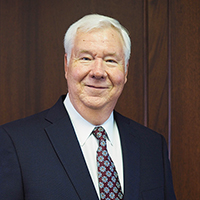Dr. David Fordham Exposes Fraud in Small Businesses
News A few years ago, Dr. David Fordham received a grant from the Center for Entrepreneurship at JMU to visit randomly selected small businesses around the country and offer them a free review of their accounting controls.
A few years ago, Dr. David Fordham received a grant from the Center for Entrepreneurship at JMU to visit randomly selected small businesses around the country and offer them a free review of their accounting controls.
Each of the businesses had to have a minimum of three non-family employees and a maximum of 35 employees, and Dr. Fordham granted each business confidentiality beforehand. The project took him three summers to complete.
“Through my previous research with small businesses, I noticed that far too many small business owners were hiring a full charge bookkeeper, then delegating all of their accounting processes and functions to this individual with no oversight or supervision,” Dr. Fordham said.
Dr. Fordham found fraud was occurring in 17 of the 56 small businesses he visited. He suspected fraud was occurring in five more businesses, but could not say for sure because the records were in such poor condition.
“The review provided me outstanding real-world examples from many different types of businesses to use in my accounting and information security classes,” Dr. Fordham said.
During his review, Dr. Fordham came across a $1 million fraud that had been occurring at one business. The bookkeeper had purchased an SUV, paid for his son’s tuition and built a dock at his lakefront home, as well as paid for other personal expenses all using the company checking account. Several people have been prosecuted as a result of Dr. Fordham’s findings. He even accompanied one small business owner to the district attorney’s office before the review was completed.
One accountant at a small business had set up a fake business on the side and was writing checks to himself at the fake business. Another accountant was purchasing diapers and children’s clothing while having her husband’s suits and her dresses dry-cleaned every week, and it was all charged to and paid for by her company. Several more accountants were skimming cash from their business’s daily receipts.
“This is what I think is happening,” Dr. Fordham said. “I think the business owner hires an honest accountant and gives him/her full charge of the finances with no oversight. After several years, the accountant realizes no one is watching the till. The accountant then begins making small, gray-area decisions, and their ethics degenerate as they realize they can use the boss’s money and no one seems to care.”
It is, however, important to note that the majority of accountants are honest individuals, even when no one is looking. Dr. Fordham found no improprieties at all in companies where the accountant had been employed five years or less. All of the thefts and frauds were committed by long-term employees working for many years with no supervision or oversight.
“Even with the companies that had no fraud occurring, I was still able to give the business owner helpful advice about the oversight of their finances,” Dr. Fordham said. “In many cases, even something as simple as knowing someone has documentation, such as asking for copies of the monthly bank statement or a daily cash report, will keep an honest accountant honest and help him/her resist temptation.”
None of the accountants engaging in fraud were Certified Public Accountants (CPAs).
“CPAs are required to subscribe themselves to a code of ethics and peer review,” said Dr. Fordham, who is also a CPA. “Knowing someone else will be checking your work helps keep you honest, which is why segregation of duties works so well in preventing fraud and theft.”
Dr. Fordham is currently working with Carol Hamilton, the director of the Center for Entrepreneurship, to publish the findings of his research.

